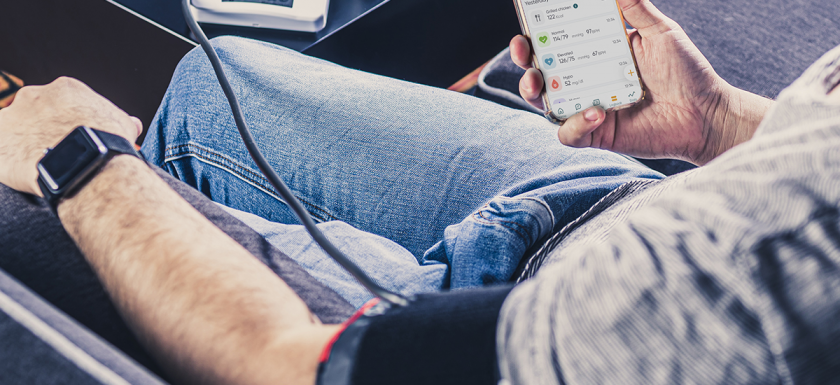
JMIR Publications recently published “Blood Pressure Monitoring as a Digital Health Tool for Improving Diabetes Clinical Outcomes: Retrospective Real-world Study” in the Journal of Medical Internet Research (JMIR), which reported that there is a lack of understanding of the association between blood glucose (BG) and blood pressure (BP) levels when using digital health tools.
By applying a rigorous study framework to digital health data, this study investigated the relationship between BP monitoring and BG and BP levels, as well as a lagged association between BP and BG levels.
These JMIR authors hypothesized that during the first 6 months of BP monitoring, BG and BP levels would decrease.
They also suggested a positive association between BP levels and the following month’s BG levels.
The researchers analyzed the digital data of the users who, in addition to BG, monitored their BP using the same app 6 months before and after starting their BP monitoring. Propensity score matching established a control group (with no blood pressure monitoring) matched on demographic and baseline clinical measures to the BPM group.
Dr. Pavel Goldstein from The University of Haifa said, “Major goals for the treatment of diabetes are to prevent or delay complications and optimize the quality of life.”
A large proportion of persons with diabetes exhibit poorly controlled hypertension, which may reflect not only delayed recognition of the presence of hypertension, clinical inaction, and poor adherence to the prescribed regimen but also uncertainty regarding the treatment targets and pathogenic correlation.
Hypertension and diabetes are major risk factors for cardiac diseases, stroke, and kidney disorders; however, hypertension is the leading cardiovascular disease – and a related cause of morbidity and mortality among persons with type 2 diabetes.
Communication of test results also has been shown to be highly desired among people with hypertension, and lifestyle-focused educational messages providing advice, motivational reminders, and support also were shown to be effective in improving hypertension and other chronic conditions.
Blood Pressure Monitoring as a Digital Health Tool for Improving Diabetes Clinical Outcomes: Retrospective Real-world Study https://t.co/ue0VdO6RsM pic.twitter.com/EwiRCFMtiN
— Tom Bellis (@tommybellis) February 8, 2022
Although mobile apps have the potential to be beneficial for people with hypertension or diabetes, little is known about their efficacy in targeting several chronic conditions at one time or monitoring both BP and BG levels on a single mobile app.
Dr Goldstein and their research team concluded in their JMIR Publications research output that their findings show a significant association between BP measurement and improved glycemic control.
A clinical impact was observed in users who measured their BG in the first 6-month period of BP monitoring. They also observed real-time linkage between a reduction in BP levels and a reduction in BG levels.
From the behavioral science perspective, this is not surprising. Simultaneously, directing effort into actionable areas for improvement of BP is likely to increase the thought and action needed for improvement of BG.
Moreover, the process of BP self-monitoring in lowering systolic and diastolic BP levels was demonstrated in this study.
Future work should focus on investigating the mechanisms underlying the comorbidity of diabetes and hypertension and their management, as well as identifying and applying mediation models and behavioral interventions that go beyond actionable multiple chronic conditions that drive prohealth behavioral change.
###
DOI – https://doi.org/10.2196/32923
Full-text – https://www.jmir.org/2022/2/e32923/
Free Altmetric Report – https://jmir.altmetric.com/details/122656680
Keywords – blood glucose, blood pressure, monitoring, digital therapeutic, diabetes, hypertension, app, model, chronic disease, health data
JMIR Publications is a leading, born-digital, open access publisher of 30+ academic journals and other innovative scientific communication products that focus on the intersection of health and technology. Its flagship journal, the Journal of Medical Internet Research, is the leading digital health journal globally in content breadth and visibility, and it is the largest journal in the medical informatics field.
To learn more about JMIR Publications, please visit https://www.JMIRPublications.com or connect with us via:
YouTube – https://www.youtube.com/c/JMIRPublications
Facebook – https://www.facebook.com/JMedInternetRes
Twitter – https://twitter.com/jmirpub
LinkedIn – https://www.linkedin.com/company/jmir-publications
Instagram – https://www.instagram.com/jmirpub/
Head Office – 130 Queens Quay East, Unit 1100 Toronto, ON, M5A 0P6 Canada
Media Contact – Communications@JMIR.org
The content of this communication is licensed under the terms of the Creative Commons Attribution License (https://creativecommons.org/licenses/by/4.0/), which permits unrestricted use, distribution, and reproduction in any medium, provided the original work, published by JMIR Publications, is properly cited.
JMIR Publications is a registered trademark of JMIR Publications.
